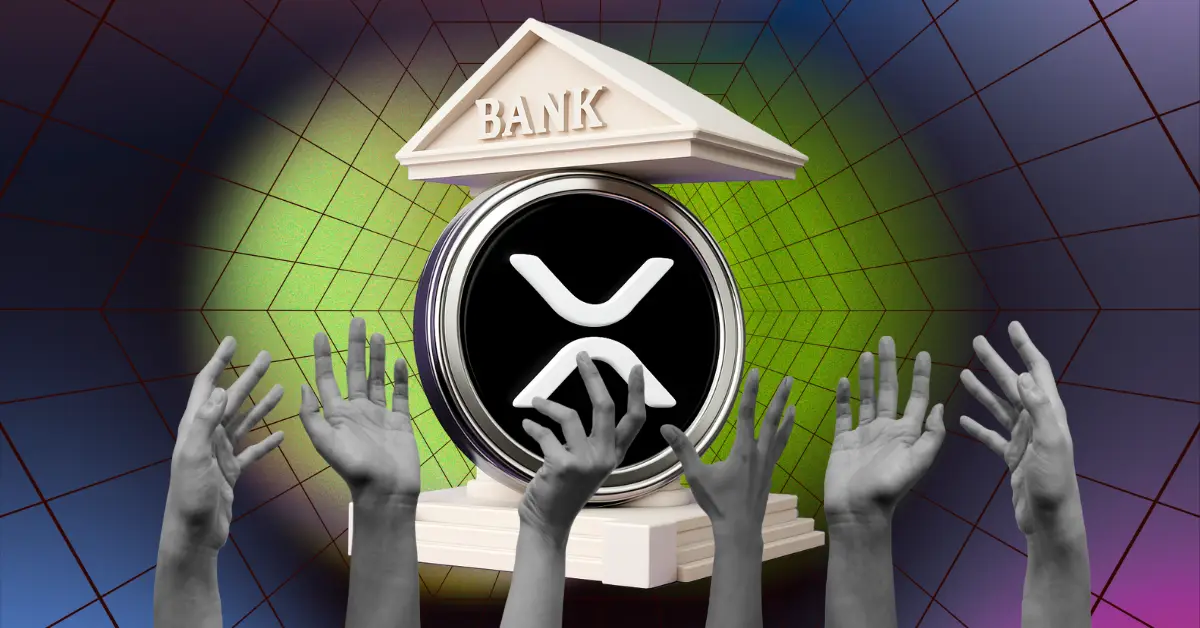
The crypto community is fired up again – this time, over rumors that Ripple could be planning to get a U.S. banking license. The chatter started after a clip from XRP Las Vegas 2025 made the rounds online, sparking wild speculation that the payments giant might be gearing up to enter traditional banking.
But is any of it true? Let’s unpack what’s fact, what’s fiction, and what’s worth watching.
It all started with a tweet quoting journalist Eleanor Terrett during a panel at XRP Las Vegas. In the clip, the discussion turns to the idea of Ripple becoming a bank. The tweet read:
“Ripple could get a banking license. Because the cost of price in payments is almost zero on the XRPLedger…Banking is just basically like breathing the air.”
That was enough to send speculation into overdrive. Crypto Twitter quickly picked up the idea, with some users claiming it was already in motion. But there’s a problem – Ripple hasn’t said anything.
There’s no official statement, no filings, and no confirmation that a banking license is even being considered.
Adding to the speculation was Greg Kidd, an early Ripple investor and former U.S. congressional candidate. At the same event, he spoke about a new kind of bank charter – one aimed at digital-first companies.
Kidd explained that this charter wouldn’t require companies to have physical branches or offer lending services. Instead, it would focus on deposits and payments only.
While it’s an interesting idea, Kidd made it clear: he’s not speaking on behalf of Ripple, and the charter is still in development. That hasn’t stopped the XRP community from connecting the dots.
Even if Ripple isn’t applying for a license just yet, it’s definitely been making moves in the banking world.
Last year, Ripple became a Platinum Member of the American Bankers Association – a move that gives the company more access to financial decision-makers and regulators.
CEO Brad Garlinghouse has also made Ripple’s position clear: they’re not trying to replace banks, they’re trying to work with them. At the Las Vegas event, he again stressed Ripple’s mission to fix cross-border payments – making them cheaper, faster, and more efficient by cutting out unnecessary middlemen.
Ripple’s long-running legal battle with the SEC could also be nearing a turning point, even though they have clearly won the largest points of contention. Attorney John Deaton recently said there’s a 70% chance that Judge Analisa Torres will approve a settlement deal and relief request.
If that happens, Ripple would be in a stronger position to expand its reach – potentially even under the kind of charter Kidd is working on.
Right now, the idea of Ripple becoming a bank is just that – an idea. There’s no confirmation. No paperwork. No public plans.
But the interest isn’t coming out of nowhere. Between Ripple’s ties to traditional finance and Greg Kidd’s new charter, there’s clearly movement happening around the edges of the banking world. Whether Ripple takes that step or not remains to be seen.
For now, it’s all eyes on what Ripple says, or doesn’t say, next. We’ll be watching and filling you in!
If Ripple secures a banking license, it would significantly boost XRP’s legitimacy and adoption. This could lead to increased demand, a potential price surge, and wider institutional use for cross-border payments, especially if it leads to more On-Demand Liquidity (ODL) adoption.
A digital-first banking charter, like the one Greg Kidd discussed, could intensify competition for traditional banks by enabling agile, technology-focused companies to offer deposit and payment services with lower overhead and faster innovation, challenging legacy systems.
Ripple explicitly aims to partner with and enhance traditional banks’ existing infrastructure for cross-border payments using XRP as a bridge currency, rather than seeking to replace them entirely, which differentiates its enterprise-focused strategy from many decentralized crypto projects.
CoinPedia has been delivering accurate and timely cryptocurrency and blockchain updates since 2017. All content is created by our expert panel of analysts and journalists, following strict Editorial Guidelines based on E-E-A-T (Experience, Expertise, Authoritativeness, Trustworthiness). Every article is fact-checked against reputable sources to ensure accuracy, transparency, and reliability. Our review policy guarantees unbiased evaluations when recommending exchanges, platforms, or tools. We strive to provide timely updates about everything crypto & blockchain, right from startups to industry majors.
All opinions and insights shared represent the author's own views on current market conditions. Please do your own research before making investment decisions. Neither the writer nor the publication assumes responsibility for your financial choices.
Sponsored content and affiliate links may appear on our site. Advertisements are marked clearly, and our editorial content remains entirely independent from our ad partners.
Investors searching for 10x returns before 2026 need to balance ambition with realism. Many of…
Ethereum (ETH)’s success story continues to inspire traders across the market. For years, ETH has…
Cryptocurrency is steadily gaining ground in the U.S., with more people and businesses exploring digital…
President Donald Trump has floated a proposal that could change the way Americans benefit from…
Coinbase has partnered with Samsung to integrate crypto trading directly into the Samsung Wallet app…
Story Highlights The live price of the Zcash token is The average price target for…